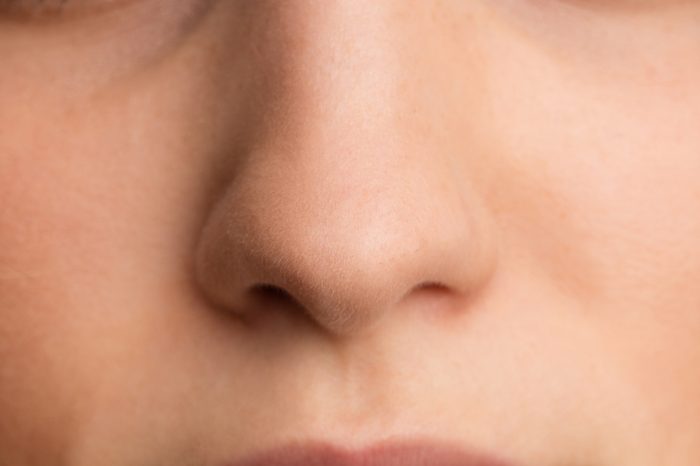
Does disease smell?
Body odor can be a sign of more than just forgetting to put on deodorant. Researchers have long known that certain illnesses including cancer, multiple sclerosis, and Parkinson’s disease, cast particular odors, says Alan Hirsch, MD, the Neurological Director of the Smell & Taste Research and Treatment Foundation in Chicago. While scent tests to diagnose disease are not quite ready for prime time, research is ongoing, says Dr. Hirsch, also the author of several books including Nutrition and Sensation. Make sure you know about these diseases that doctors miss the most.
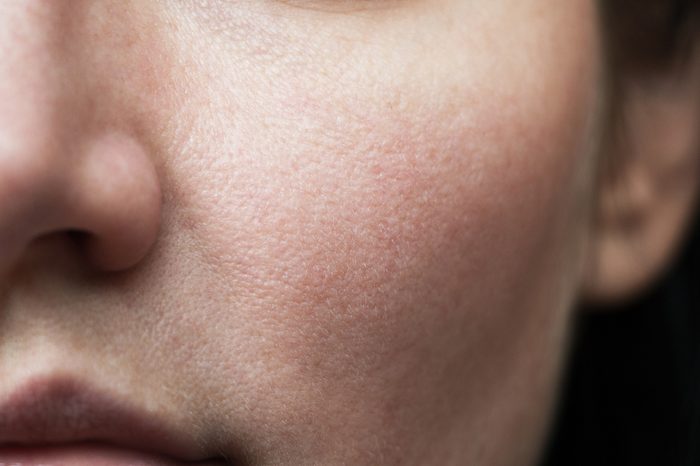
Why do diseases smell?
Diseases change the way a body works, says Yehuda Zeiri, PhD, a biomedical engineer at Ben-Gurion University’s Kiryat Bergman Campus in Be’er-Sheva, Israel. “When disease leads to enhancement of new and different biochemical processes in the body, these processes may lead to the production of small volatile molecules,” he explains. “These [molecules] can be transported by the blood to the lungs and be released in exhaled breath; they can also be released in the urine and sweat.”

Diagnosing diseases through smell
Researchers are developing ways to detect the scent of disease. “According to the scientific literature there is evidence that the scent may contain markers for lung cancer, breast cancer, diabetes, melanoma, and more,” Dr. Zeiri says. In the future, doctors may be able to spot cancer, diabetes, kidney disease, and a host of other conditions solely by their smell—and well before other symptoms show up. And while that research is promising, don’t believe these health myths that make doctors cringe. Now, check out the diseases we can already detect through smell.

Preeclampsia
Pregnancy-related high blood pressure—preeclampsia—is an early warning sign of deadly eclampsia, which is why it’s so important to spot the condition early. A 2016 study in Advanced Materials Science showed that researchers could detect preeclampsia with 84 percent accuracy based on a mother’s “breathprint”—like your fingerprint, your breath contains unique markers that can reveal a lot about your health.

Lung cancer
There is compelling research that indicates lung cancer can be detected by smell, Dr. Hirsch says. An invention called “NaNose”—a breathalyzer-type device developed by an Israeli company—is up to 90 percent accurate at diagnosing lung cancer; the device detects a special “odor” emitted by the cancer cells. Doctors can use the same technology to identify Parkinson’s disease, other cancers, kidney failure, multiple sclerosis, and Crohn’s disease—and the accuracy rate is at 86 percent, according to a study published in 2016 in the journal ACS Nano. And, for when you don’t want to lead with an odor, here’s a dentist’s tips for beating bad breath.

Kidney failure
University of Illinois researchers have developed a disposable device that can detect the breathprint of kidney failure and potentially get people to a doctor sooner—when treatment will be more effective. “In the clinical setting, physicians use bulky instruments, basically the size of a big table, to detect and analyze these compounds. We want to hand out a cheap sensor chip to patients so they can use it and throw it away,” says professor Ying Diao, PhD, an assistant professor of chemical and biomolecular engineering at the University of Illinois. Watch out for these other silent signs your body might be in big trouble.
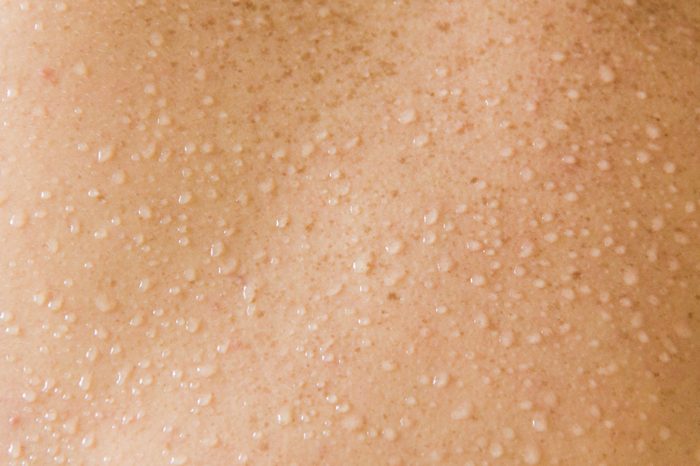
Liver failure
When your liver stops doing its job and processing toxins, contaminants will build up in your urine, perspiration, and even your breath—and the odor will be like raw fish.

Multiple sclerosis
MS is an autoimmune disease, where the body begins attacking its own central nervous system. The resulting nerve damage can cause numbness, tingling, and problems with vision and gait. The condition is most often diagnosed by magnetic resonance imaging (MRI) of the brain or a “spinal tap,” but MS may also have its own distinct breathprint, according to a 2017 report in ACS Chemical Neuroscience. In the study, exhaled breath was collected from 146 people with MS and 58 people without this progressive disease—and researchers found that it predicted the disease by up to 90 percent. Now learn the other silent symptoms of MS.

Infectious disease
Worried that you should put some space between you and your spouse or a co-worker who might be coming down with the flu? Give ’em a sniff, according to a small study in the Proceedings of the National Academy of Sciences. In this study, published in 2017, participants could identify sick versus healthy people simply by smelling their body odor and looking at photographs of their faces for visual cues, such as skin pallor.
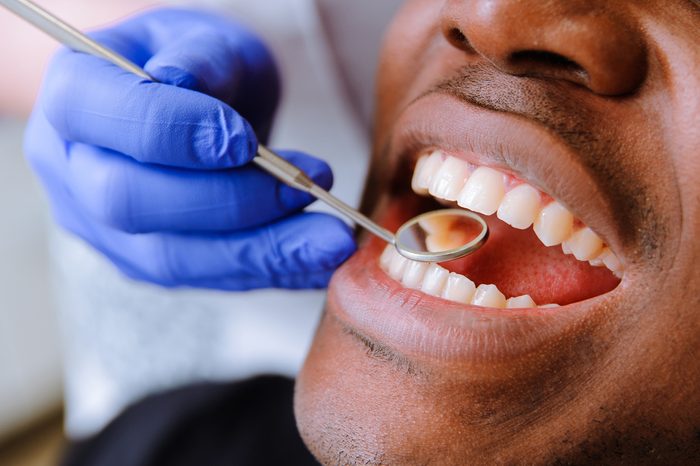
Gum disease
If you have an infection in your gums, the bacteria releases waste products such as hydrogen sulfide, which smells like rotten eggs, explains Dr. Hirsch. “This smell tells us that the person has gum disease, a dental abscess, or poor oral hygiene,” he says. “The abscess could be hidden in a crevice that is hard to find on an X-ray, but the scent can encourage your dentist to look harder and order a panoramic X-rays to find the culprit.” These are the shocking diseases that eye doctors find first.
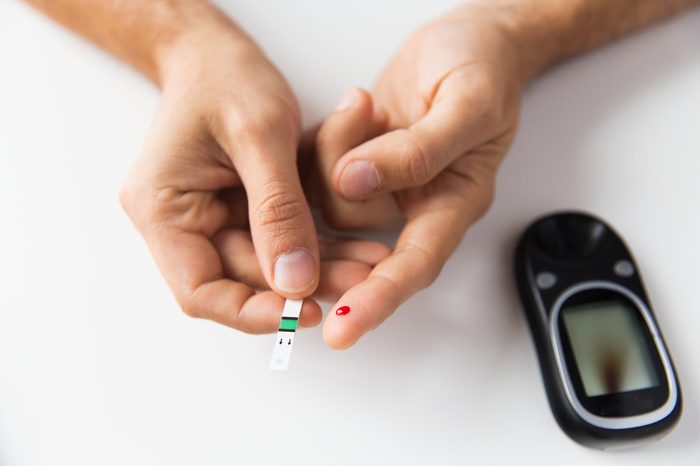
Diabetes
People with diabetes can have a fruity smell to their breath, Dr. Hirsch says. This can signal diabetic ketosis: When there isn’t enough of the hormone insulin or the body isn’t using it correctly, we start burning fat for fuel. This can lead to potentially fatal ketoacidosis if not caught and addressed early.

Mono
The Epstein-Barr virus strikes about 90 percent of the population worldwide. Some of the time, it leads to infectious mononucleosis, or mono. For some people with mono, sour breath is among the first signs, Dr. Hirsch says. Check out 11 more silent warning signs of mono.

Trimethylaminuria
Also known as fish-odor syndrome, trimethylaminuria is a rare metabolic disorder that occurs when a person can’t digest certain foods, including eggs, liver, legumes, fish, and some vegetables. As the foods sit undigested in the intestines, trimethylamine builds up and is expelled in bodily fluids like sweat and saliva, Dr. Hirsch explains. The smell is described as similar to rotting fish, urine, days-old garbage, or rotten eggs. It’s not a life-threatening condition, but the unpleasant odor can lead to social isolation, depression, and emotional disorders.

Psychiatric illness
Bad breath often accompanies schizophrenia and other severe types of psychosis, Dr. Hirsch says. “These individuals are fearful of others and one of the ways they may keep people away is by not bathing,” he says. Not taking care of one’s self can also signal a relapse. And while those facts are true, don’t believe these myths about mental health.

Maple syrup disorder
Babies born with this genetic disorder can’t break down certain parts of proteins and, as a result, their urine, ear wax, and other bodily fluids may smell like maple syrup, Dr. Hirsch says. Doctors are also trained to be observant, and this is what they can tell by just looking at you.

